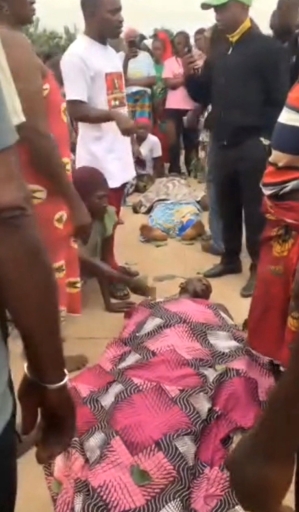
Fulani herdsmen on Thursday (Nov. 6) killed two Christians in Nigeria’s Nasarawa state and two others in Plateau state following the slaughter of 11 Christians in the latter state earlier in the week, sources said.
In Nasarawa state’s predominantly Christian Sarkin Noma village, Keana County, herdsman invaded at about 11 p.m. while residents were sleeping in their homes, killed two Christians and abducted another, said area resident Dooshima Tse.
Musa Adamu, another resident, confirmed the killings and kidnapping.
“Keana Local Government Area is no longer safe,” Adamau said. “Our peaceful home, where we enjoyed all the comforts, has been turned into a den of armed bandits. Prior to Thursday night’s attack, there was a kidnapping case in Giza community, where a husband and wife were kidnapped from their house, and up till this moment, there’s no news on their whereabouts. We kindly request the help of security operatives to act swiftly and restore peace in our communities as a matter of urgency.”
Village resident Innocent James described the assailants in the Sarkin Noma attack as “gunmen suspected to be Fulani herdsmen.”
Hundreds of village residents staged protests over the killings on Friday (Nov. 7), by blocking the highway between the cities of Lafia in Nasarawa state and Makurdi in Benue state.
Plateau State Slayings
In neighboring Plateau state, central Nigeria, Fulani herdsmen killed two Christians on Thursday (Nov. 6) and 11 others earlier in attacks in Riyom and Mangu counties over the past week, residents said.
On Thursday night (Nov. 6) in predominantly Christian Rachi village, Riyom County, Fulanis killed two Christians and wounded five others, said Dalyop Solomon Mwantiri, an attorney based Jos. He identified one of the slain as Dalyop Dangyang.
“This attack is part of a renewed wave of coordinated violence in Riyom and neighboring local government areas,” Mwantiri said in a press statement. “The attacks cannot be left unchecked.”
The government must act decisively to protect communities and restore security, he said.
“Some residents said the attacks followed the arrival of armed groups in the area,” Mwantiri said. “It is a cause of concern that previous designations and warnings have done little to deter further violence.”
On Saturday (Nov. 1), six residents of Kwi village in Riyom County were killed in another attack by the Fulani militants, he said.
“That incident, which took place at approximately 9:50 p.m., followed an earlier shooting earlier the same day in which Mr. Kurang Daniel was killed while harvesting maize around 4 p.m.,” he said. “The assailants arrived on motorcycles and were believed to have come from Fass, a settlement in the state.”
On Sunday (Nov. 2), Fulani herdsmen killed Christian farmer Bitrus Dakwan as he slept in his house in predominantly Christian Kubon village, Mangu County, said area resident John Maikudi.
Also in Mangu County, Fulani herdsmen attacked Pushit village on Oct. 31, killing three Christians, said community leader Friday Dawan.
“We are sad to alert the public that again Fulani herdsmen have attacked Pushit community, killing three Christians,” Dawan said. “We call upon security operatives in our local government area and Plateau state to rise to the challenge of curbing these unwarranted assaults on innocent lives.”
Numbering in the millions across Nigeria and the Sahel, predominantly Muslim Fulani comprise hundreds of clans of many different lineages who do not hold extremist views, but some Fulani do adhere to radical Islamist ideology, the United Kingdom’s All-Party Parliamentary Group for International Freedom or Belief (APPG) noted in a 2020 report.
“They adopt a comparable strategy to Boko Haram and ISWAP and demonstrate a clear intent to target Christians and potent symbols of Christian identity,” the APPG report states.
Christian leaders in Nigeria have said they believe herdsmen attacks on Christian communities in Nigeria’s Middle Belt are inspired by their desire to forcefully take over Christians’ lands and impose Islam as desertification has made it difficult for them to sustain their herds.
Nigeria remained among the most dangerous places on earth for Christians, according to Open Doors’ 2025 World Watch List of the countries where it is most difficult to be a Christian. Of the 4,476 Christians killed for their faith worldwide during the reporting period, 3,100 (69 percent) were in Nigeria, according to the WWL.
“The measure of anti-Christian violence in the country is already at the maximum possible under World Watch List methodology,” the report stated.
In the country’s North-Central zone, where Christians are more common than they are in the North-East and North-West, Islamic extremist Fulani militia attack farming communities, killing many hundreds, Christians above all, according to the report. Jihadist groups such as Boko Haram and the splinter group Islamic State in West Africa Province (ISWAP), among others, are also active in the country’s northern states, where federal government control is scant and Christians and their communities continue to be the targets of raids, sexual violence, and roadblock killings, according to the report. Abductions for ransom have increased considerably in recent years.
The violence has spread to southern states, and a new jihadist terror group, Lakurawa, has emerged in the northwest, armed with advanced weaponry and a radical Islamist agenda, the WWL noted. Lakurawa is affiliated with the expansionist Al-Qaeda insurgency Jama’a Nusrat ul-Islam wa al-Muslimin, or JNIM, originating in Mali.
Nigeria ranked seventh on the 2025 WWL list of the 50 countries where it is most difficult to be a Christian.






